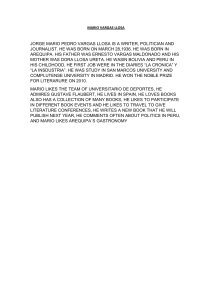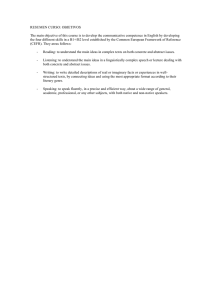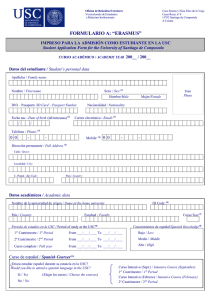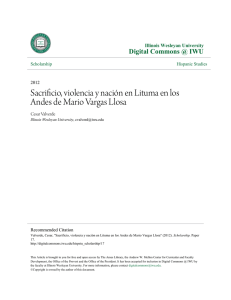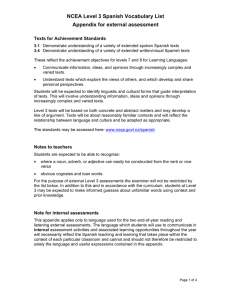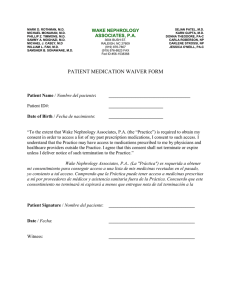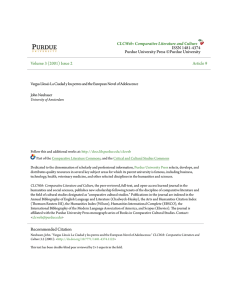SPAN 301 Introduction to Hispanic Literature and Film SYLLABUS
Anuncio
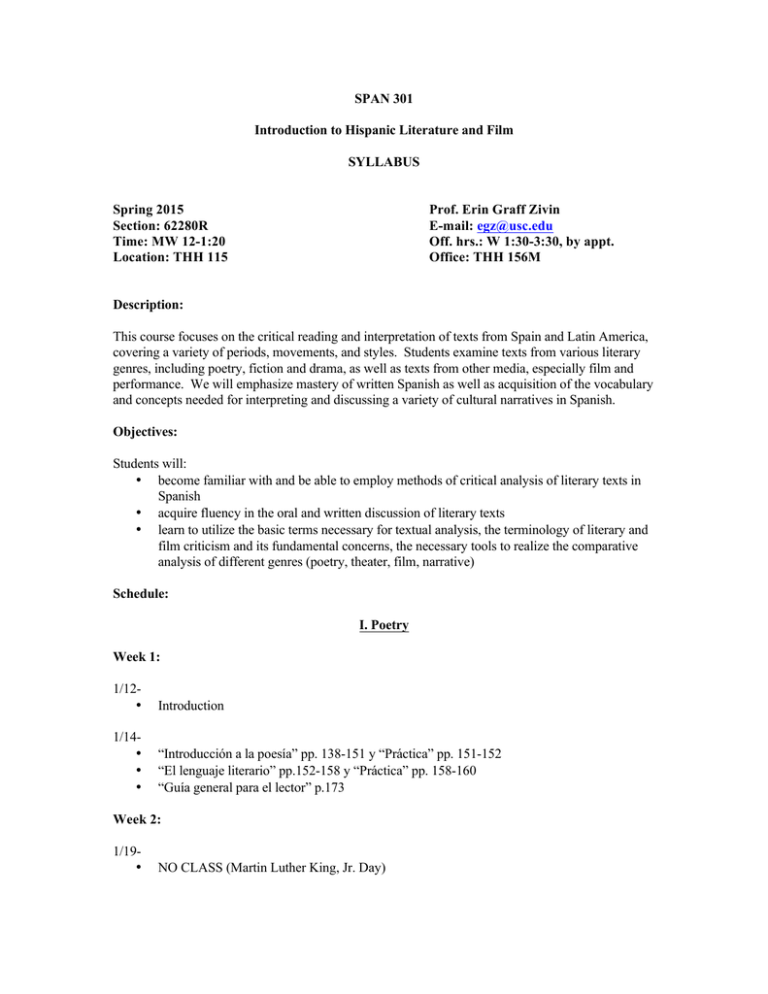
SPAN 301 Introduction to Hispanic Literature and Film SYLLABUS Spring 2015 Section: 62280R Time: MW 12-1:20 Location: THH 115 Prof. Erin Graff Zivin E-mail: egz@usc.edu Off. hrs.: W 1:30-3:30, by appt. Office: THH 156M Description: This course focuses on the critical reading and interpretation of texts from Spain and Latin America, covering a variety of periods, movements, and styles. Students examine texts from various literary genres, including poetry, fiction and drama, as well as texts from other media, especially film and performance. We will emphasize mastery of written Spanish as well as acquisition of the vocabulary and concepts needed for interpreting and discussing a variety of cultural narratives in Spanish. Objectives: Students will: • become familiar with and be able to employ methods of critical analysis of literary texts in Spanish • acquire fluency in the oral and written discussion of literary texts • learn to utilize the basic terms necessary for textual analysis, the terminology of literary and film criticism and its fundamental concerns, the necessary tools to realize the comparative analysis of different genres (poetry, theater, film, narrative) Schedule: I. Poetry Week 1: 1/12• Introduction 1/14• • • “Introducción a la poesía” pp. 138-151 y “Práctica” pp. 151-152 “El lenguaje literario” pp.152-158 y “Práctica” pp. 158-160 “Guía general para el lector” p.173 Week 2: 1/19• NO CLASS (Martin Luther King, Jr. Day) 1/21• • Garcilaso de la Vega, “Soneto XXIII” pp. 176-178 Sor Juana Inés de la Cruz, “A su retrato,” “A una rosa” pp. 190-192 Week 3: 1/26• • • José Martí, “Dos patrias” pp. 200-201 Rubén Darío, “El cisne” pp. 206-207 Gabriela Mistral, “Meciendo” pp. 215-216 y “Cuestionario” 1/28• • Nicolás Guillén, “Sensemayá” pp. 229-230 Nancy Morejón, “Mujer negra” pp. 246-249 y “Cuestionario” II. Theater Week 4: 2/2• EXAM #1 • • “Introducción al drama” pp. 252-265 y “Práctica” 265-273 “Guía general para el lector” pp. 290-291 2/4- Week 5: 2/9Federico García Lorca, “La casa de Bernarda Alba,” Acto I, pp. 335-347 2/11• Lorca, Actos II-III, pp. 348-371 Week 6: 2/16• NO CLASS (President’s Day) 2/18• Presentations Week 7: 2/23• Presentations 2/25• Presentations III. Film Week 8: 3/2• EXAM #2 • Introducción al cine, “Dirección y montaje,” Diccionario de creación cinematográfica pp. 221-242 Luis Buñuel, Un chien andalou 3/4- • Week 9: 3/9• 3/11• Pedro Almodóvar, Todo sobre mi madre Todo sobre mi madre (cont.) Week 10: • NO CLASS (SPRING BREAK) Week 11: 3/23• Icíar Bollaín, También la lluvia 3/25• También la lluvia (cont.) IV. Narrative Prose: Short Story Week 12: 3/30• • “Introducción a la narrativa” y “Práctica” pp. 10-24 “Guía general para el lector” pp. 41 4/1• • Don Juan Manuel, “Lo que sucedió a un mozo que casó con una muchacha de muy mal carácter” pp. 42-46 y “Cuestionario” Jorge Luis Borges, “El etnógrafo” pp. 59-61 Week 13: 4/6• Julio Cortázar, “La noche boca arriba” pp. 61-68 y “Cuestionario” 4/8• EXAM #3 V. Narrative Prose: Novel Week 14: 4/13• Mario Vargas Llosa, El hablador 4/15• Vargas Llosa, El hablador (cont.) Week 15: 4/20• Vargas Llosa, El hablador (cont.) 4/22• Vargas Llosa, El hablador (cont.) Week 16: 4/27• REVIEW 4/29• TAKE HOME FINAL EXAM (distributed in class; due Friday 5/8 at 1:00 p.m.) Requirements: Homework (15%) Exams (10% each = 30%) Dramatic presentation or video project, with one-page written summary (15%) Participation (10%) Take-home final (30%) *NO CREDIT GIVEN FOR ASSIGNMENTS HANDED IN LATE Texts: • • • Friedman, Valdivieso & Virgillo, Aproximaciones al estudio de la literatura hispánica, 6th edition (New York: McGraw-Hill, 2007) Mario Vargas Llosa, El hablador (Barcelona: Seix Barral, 1987) Antonio Sánchez-Escalonilla, ed. Diccionario de creación cinematográfica (“Dirección y montaje” pp. 221-242) (reading to be distributed) Dramatic presentation: After reading the play “La casa de Bernarda Alba,” each student will be required to prepare (individually or in groups) a version of one scene to present in class. This can take the form of a dramatic presentation, a video, a modern adaptation of the work, a musical performance or other interpretation. Although some will present in groups, each student will be responsible for a one paragraph description of the artistic and ideological proposal of the presentation (that is, what you want to achieve and communicate with your version and its relation with the original) as well as your individual role in the production. Statement on Academic Conduct and Support Systems Academic Conduct Plagiarism – presenting someone else’s ideas as your own, either verbatim or recast in your own words – is a serious academic offense with serious consequences. Please familiarize yourself with the discussion of plagiarism in SCampus in Section 11, Behavior Violating University Standardshttps://scampus.usc.edu/1100-behaviorviolating-university-standards-and-appropriate-sanctions/. Other forms of academic dishonesty are equally unacceptable. See additional information in SCampus and university policies on scientific misconduct, http://policy.usc.edu/scientific-misconduct/. Discrimination, sexual assault, and harassment are not tolerated by the university. You are encouraged to report any incidents to the Office of Equity and Diversity http://equity.usc.edu/ or to the Department of Public Safety http://capsnet.usc.edu/department/department-public-safety/online-forms/contactus. This is important for the safety whole USC community. Another member of the university community – such as a friend, classmate, advisor, or faculty member – can help initiate the report, or can initiate the report on behalf of another person. The Center for Women and Men http://www.usc.edu/student-affairs/cwm/ provides 24/7 confidential support, and the sexual assault resource center webpage sarc@usc.edu describes reporting options and other resources. Support Systems A number of USC’s schools provide support for students who need help with scholarly writing. Check with your advisor or program staff to find out more. Students whose primary language is not English should check with the American Language Institute http://dornsife.usc.edu/ali, which sponsors courses and workshops specifically for international graduate students. The Office of Disability Services and Programs http://sait.usc.edu/academicsupport/centerprograms/dsp/home_index.htmlprovides certification for students with disabilities and helps arrange the relevant accommodations. If an officially declared emergency makes travel to campus infeasible, USC Emergency Information http://emergency.usc.edu/will provide safety and other updates, including ways in which instruction will be continued by means of blackboard, teleconferencing, and other technology.
